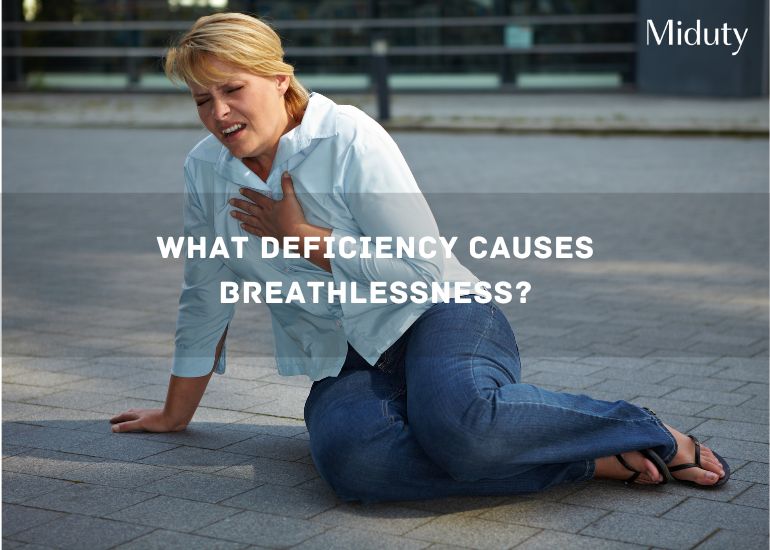What deficiency causes Breathlessness?

Do you find it difficult to breathe?
Breathing is a simple process that happens naturally right? Just in and out. It turns out that there are correct and incorrect ways to breathe in oxygen for your body.
Even if breathing occurs effortlessly, you should always keep your lungs and the quality of the air in mind! And being out of breath is the sensation of having insufficient air in your lungs.
Do you want to know how to handle being out of breath and the reasons what deficiency causes breathlessness?
Shortness of breath or breathlessness occurs when you feel like you are not getting enough air or oxygen into your lungs.
Shortness of breath is a common symptom of heart and lung disease. However, it can also be a symptom of other conditions such as asthma, allergies, or nervousness. Intense exercise or a cold might also sometimes cause you to feel out of breath.
Continue reading to the end if you want to learn more about these symptoms or if you want to find out whether you are experiencing them as well.
What is Breathlessness?
Breathlessness is the uncomfortable feeling of quick or hard breathing. People report feeling bloated, short of breath, or exhausted. The medical name for it is dyspnea. Your chest might feel constricted, and breathing might be difficult.
And now you must be wondering what symptoms you can experience if you have a breathing difficulty? Right! Let’s have a look.
For instance, perhaps you find it difficult to keep up with a walking companion or to up a flight of stairs.
Before, you could pause, take a deep breath, and continue, but now it's more difficult to do that?
Does your chest become tight and does it pain while you inhale?
Shortness of breath during exercise may be the first sign. Additionally, breathing difficulties can worsen with time to the point where they affect your ability to relax.
Breathing is something that a lot of people tend to overthink, but it's vital to remember that your body is designed to do it. Depending on your activities, your respiratory systems know just when to advise you to adjust the depth of your breathing.
Causes of Breathlessness
It is natural to require a few moments to regain your breath in situations like stress and anxiety. However, this usually improves with relaxation, and you'll be breathing normally again in a few minutes. [1]
Temporary dyspnea or shortness of breath may occur if you are at a higher height and your body is not adaptable having less oxygen available. Causes of Breathlessness could be also linked to a variety of medical disorders. Conditions that cause abrupt shortness of breath should always be treated as emergencies.
The following are the short-term causes of breathlessness:
- Pneumonia
- Low Blood Pressure
- A blood clot in the lungs
- Stress or Anxiety
- Sudden heart failure
- Collapsed Lung
- Overweight
- High Cholesterol
- Asthma
Breathlessness in Covid
One of the characteristic signs of COVID-19, the disease produced by the novel coronavirus SARS-CoV-2, is shortness of breath. Unlike many other illnesses that can cause shortness of breath, COVID-19 patients' symptoms can continue and rapidly worsen.
Breathlessness in covid typically appears a few days after infection. Some people, however, may not have this symptom at all.
According to the Centre for Disease Control and Prevention, 30-40% of people experienced breathlessness in covid. [2]
Breathlessness during Pregnancy

As pregnancy advances, a person may find it difficult to catch their breath after performing everyday duties like climbing the stairs.
Studies reveal, 60-70% of women experience breathlessness during pregnancy. [3] The enlarging uterus pushing up on the lungs, as well as hormonal changes, are among the causes.
Breathlessness during pregnancy is usually not dangerous. However, in some circumstances, more significant pregnancy issues can cause breathing difficulties.
Unless there is an underlying problem that necessitates medical intervention, treatment is largely limited to home remedies.
Other causes of Breathlessness
Breathlessness due to anxiety: Because of fluctuations in heart rate, anxiety can produce shortness of breath. Your body's natural fear response is anxiety. This is referred to as the fight-or-flight reaction. Your body reacts physically and mentally to prepare you to fight or flee a potentially dangerous scenario.
One of these responses is shortness of breath. You may experience shortness of breath, chest tightness, suffocation, or a desire for fresh air.
Anxiety and respiratory symptoms, particularly shortness of breath, have been linked in studies. [4]
Breathlessness due to acidity: Acid reflux happens when stomach acid flows back into the esophagus. When this happens, the acid can burn and enlarge the airways. This can cause respiratory problems. Acid reflux occurs when stomach acid flows back into the esophagus. When this happens, the acid can irritate and enlarge the airways. This can cause respiratory problems.
According to a study, there is a bidirectional association between GERD and asthma. [5] This indicates that people who have GERD are more inclined to suffer from asthma, and people who have asthma are more prone to GERD.
Sleep apnea is one of the most prevalent causes of breathlessness while sleeping. While it is commonly mistaken for snoring, sleep apnea is a potentially serious sleep disease in which breathing regularly stops and starts. Sleep apnea occurs when the muscles in your throat relax and clog your airways, particularly when laying on your back.
The following are the symptoms of breathlessness while sleeping:
- Snoring
- Gasping for Breath during Sleep
- Dry Mouth
- Sore Throat
- Difficulty Sleeping
- Headaches
- Irritability
- Daytime Sleep
How to get rid of Breathlessness?
If you want to know how to get rid of breathlessness, continue reading this blog.
- Practicing Breathing Techniques
A number of breathing techniques can help in giving you relief.
You can do pursed lips breathing exercise which is one of the most effective breathing exercises:
- Relax your neck and shoulder muscles while sitting in a chair or slightly relaxing.
- Inhale through your nose for 2 seconds with your mouth closed.
- Exhale Slowly with your lips pursed as if you are going to whistle.
- Repeat the inhaling and exhaling cycle for 2 minutes several times each day as needed.
- Reduce Stress by doing Yoga
In addition to breathing techniques, which are helpful for stress reduction, you may wish to try some other calming practices, such as yoga. Yoga can be adopted into your everyday life so that you can experience the health advantages on a regular basis and ideally feel more relaxed, which always aids in healthy breathing.
You can also subscribe to Fit With Palak where I regularly conduct yoga and workout sessions. [6]
- Shut your mouth and let’s nose do it’s work
Breathing problems can also be caused by air pollution and pollutants in the air. Consider wearing a mask to block out lung irritants if you live in a polluted area, and make absolutely sure your workspace is well-ventilated. Also consider taking liver Detox for body’s detoxification.
- Take a Supplement
Our response to these breathing issues are usually inhalers or some instant treatment. Right? But we have never thought that we should focus on permanent reversal instead of some temporary relief.
Now your question might be “If not inhalers then what can be the treatment instead”? Well let me guide you through!
Quercetin, the most widely utilised and well-known flavonol obtained from nature. It also helps fight off infections and inflammation caused by WBC’s.
“How does quercetin impact breathing”?
Plant polyphenol quercetin has strong anti-inflammatory and antioxidant effects. Researches has indicated that eating a diet high in quercetin lowers the chance of developing asthma, bronchial hyperreactivity, and chronic obstructive pulmonary disease.
Miduty's Immune Sheild contains a liposomal form of quercetin that can be better absorbed by the body than the normal quercetin supplements available in the market.
The liposomal vitamins don't require digestion, which implies that a big portion of the vitamin is preserved while we're talking about them. When compared to typical vitamins, liposomal distribution is advantageous because of its high bioavailability rate, which also leads to a high absorption rate.
And do you know – Quercetin is one of such things which naturally cures all the symptoms related to breathlessness or any other breathing issues.
When histamines are released more steadily from some immune cells, symptoms including coughing, watery eyes, runny noses, hives, swollen lips or tongue, and indigestion are less likely to occur.
Taking a supplement with anti-inflammatory effects can help you with breathing problems. Immune Shield supplement can help you in fighting respiratory allergies. It includes Bromelain which is extracted from pineapple and has anti-inflammatory effects. Studies have shown that it is particularly useful in treating respiratory issues. [7]
Many other inflammatory health issues, including as heart disease, blood vessel issues, allergies, infections, chronic fatigue, and symptoms of autoimmune diseases like arthritis, can be controlled by quercetin.
References
[1] https://www.ncbi.nlm.nih.gov/books/NBK499847/
[3] https://onlinelibrary.wiley.com/doi/pdf/10.1002/clc.22452
[4] https://pubmed.ncbi.nlm.nih.gov/30626156/
[5] https://www.sciencedirect.com/science/article/abs/pii/S2213219819309377
[6] https://www.ncbi.nlm.nih.gov/pmc/articles/PMC6368458/
[7] https://europepmc.org/article/med/11410400




